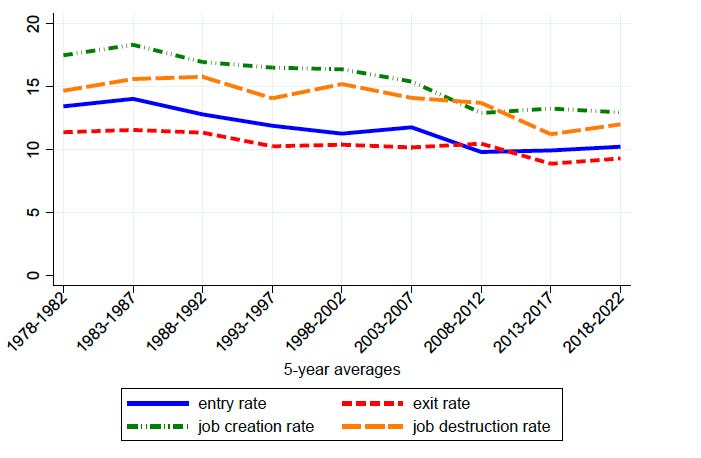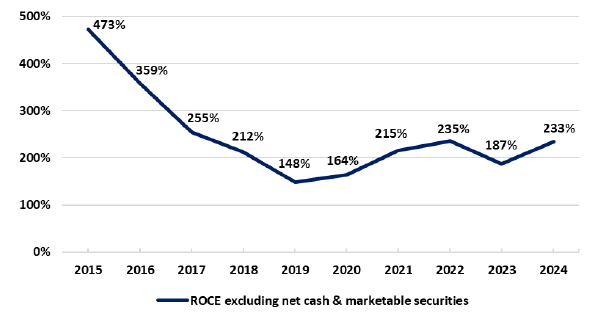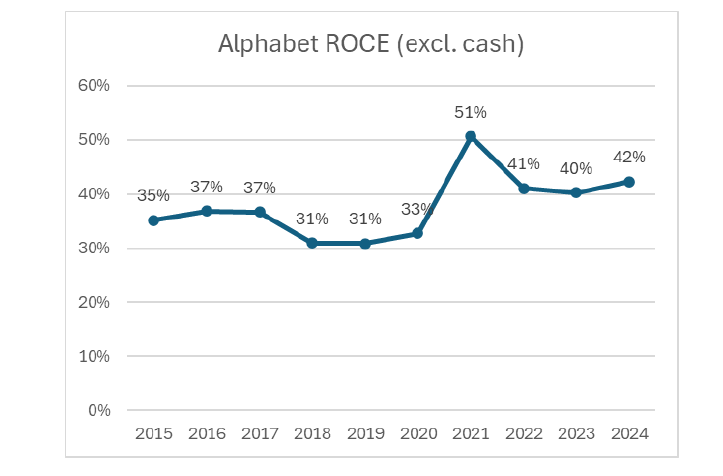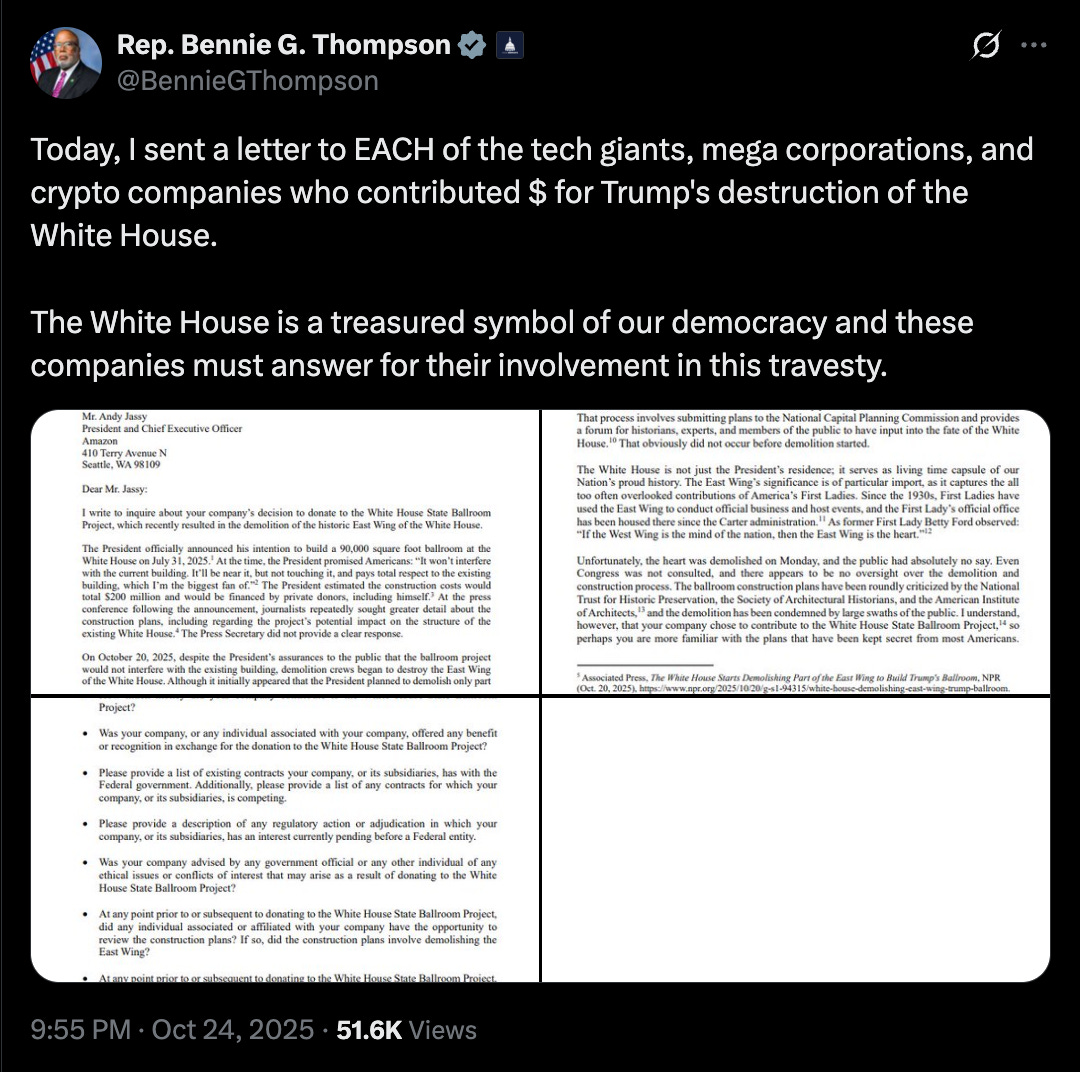Top Hat & Thimble - October 2025
Welcome to NextGen Competition’s monthly recap, delivering insider insights on antitrust battles, industry shakeups, AI trends, and more.
Two key themes stood out for me in this year’s Nobel Prize in economics awarded to Joel Mokyr, Philippe Aghion, and Peter Howitt.
The first is Joel Mokyr’s work, which helps us better understand the conditions under which technological progress can translate into sustained economic growth. One of the key prerequisites he identified is that we must understand how and why a technology works for it to produce growth. As he explains (see scientific background):
“When no one knew why things worked, even radical technological shifts failed to generate the applications that made them useful in production processes. In such a world, economic resources were not allocated towards improving technologies, as potential investors were just as likely to waste valuable resources on fruitless inventions that would never work, such as perpetual motion machines or artificially created gold”
Change that last bit to generative AI foundation models (Gen AI) and we are seeing this dynamic play out today with unsustainable circular investments in a technology whose inner workings we do not understand. Not knowing how Gen AI works also results in unforeseen effects like increased cybersecurity risks and harm to children.
These investments combined with Big Tech’s role as gatekeepers to markets and customers has also led to Big Tech’s market dominance becoming even more extreme. As the article notes:
“Eight of the 10 biggest stocks in the S&P 500 are tech stocks. Those eight companies account for 36 per cent of the entire US market’s value, 60 per cent of the gains in the index since the market bottomed in April and almost 80 per cent of the S&P 500’s net income growth in the last year.”
This dominance of Big Tech is linked to the second theme that stood out for me. The work of Philippe Aghion and Peter Howitt shows that another key component of technology leading to sustained growth is the ability of new companies and innovators to challenge and take business from incumbents. This is the process of creative destruction whereby successful innovators can destroy, fully or partially, the monopoly rents of incumbent firms.
This technology dynamism has been in decline recently. We can see this decline in aggregate US data since the mid-2000s as shown in the figure below which shows firm entry and exit rates and the rates of job entry and creation.
Declining U.S. Dynamism Since the Mid-2000s
Source: Figure 8, Scientific background to the Nobel Prize in Economic Sciences 2025
Big Tech’s dominance is likely a key part of this story. For example, analysis by the UK’s CMA finds that Google and Apple have persistently (over the last ten years) earned in excess of the normal rate of return (see figures below), signaling a lack of competition in key technology markets. The CMA also concludes that there is no prospect of this changing without policy intervention in general search and search advertising services, and the mobile ecosystem.
Apple Return on Capital Employed has been much higher than a competitive market rate of 10-15%
Source: Figure B.7, Appendix B, Strategic Market Status Investigation into Apple’s Mobile Platform.
Google Return on Capital Employed Has Been Much Higher Than a Competitive Market Rate of 10-15%
Source: Figure B.4, Appendix B, Strategic Market Status Investigation into Google’s Mobile Platform.
Big Tech’s lock on our economy and on technology development results in a lack of dynamism which means we are all losing out on potential growth and productivity gains. The work of this year’s economic noble laureates reinforces the need for a competitive technology ecosystem that we at NextGen Competition are fighting for. It is essential to have more competition to unlock growth and empower consumers, workers, and small businesses.
Thank you for reading and your support.
With regards,
Sumit Sharma
Executive Director
NextGen Competition
Big Tech’s Most Effective Lobbyist Is Temporarily Constrained
It’s Day 35 of the government shutdown, and there’s little to celebrate as millions go unpaid and SNAP benefits lapse, leaving families hungry. Still, NextGen Competition’s executive director argues in Common Dreams that one small upside is this: it has sidelined House Judiciary Chair Jim Jordan, who is quickly becoming Big Tech No. 1 lobbyist.
Sumit argues that under Jim Jordan, House Judiciary hearings have shifted from bipartisan investigations into corporate power of prior years. Now, it’s just “theater,” “viral hearings,” and a “waste of taxpayer dollars.”
The House Judiciary Committee under Jim Jordan has not merely diverged from bipartisan concerns over corporate power and its harms to children. It has become the perfect rhetorical counteroffensive by helping neutralize any meaningful legislative solutions by redefining the very nature of the threat. Where most see a market failure requiring economic intervention, the House Judiciary Committee under Chairman Jim Jordan alleges political persecution requiring investigations into government “weaponization.” This redefinition is the single most valuable outcome a regulated industry could hope for from its oversight body, transforming a legislative threat into a political shield.
House Republicans keep promising a crusade against Big Tech’s power. If they were serious, they’d likely find support from Democrats. But as long as Jim Jordan leads the House Judiciary Committee, we’re stuck watching Big Tech’s errand boy “traveling the world on our dime” to defend Apple, Amazon, Google, Meta, and Microsoft from meaningful reform. Read Sumit Sharma’s full op-ed here.
Bending the Knee for a Ballroom: Big Tech’s Capitulation
We all watched in horror as construction crews demolished the East Wing of the White House. In what has quickly become a defining symbol of Donald Trump’s presidency, it should surprise no one that Apple, Amazon, Google, Meta, Microsoft, and Palantir were among the top donors on the White House list.
We laughed, then cried, when Mother Jones reporter Tim Murphy sent a photo of the demolished East Wing—and a request for comment—to these companies to make sure they were aware of the destruction they had underwritten. None responded, aside from a dismissive quote from Microsoft.
Given how corrupt and transactional this administration is, who could blame these companies? They have spent lavishly on the president and, in return, have largely avoided tariffs, significant court fines, and meaningful regulation.
But while these companies may be able to avoid responding to reporters, it’s a lot harder to ignore Congress. That’s why we applauded Rep. Bennie G. Thompson for sending a letter to over 20 corporations demanding answers, “including the amount of their donations and whether they had been promised anything in return.”
Other Competition News
Headlines from the past month you may have missed:
David vs. Goliath: New Mexico Attorney General Raúl Torrez is making headlines for taking Meta to court, alleging the company’s algorithms enable child exploitation at scale. The suit, one of the first of its kind, is expected to go before a jury next year, a historic moment in the push to hold social media giants accountable.
“Warnings were disregarded, over and over and over again. It’s a series of decisions that demonstrate a pattern of conduct that favors profit over safety.”
With Congress gridlocked, it’s state leaders like Torrez who are stepping in to confront Big Tech’s most egregious harms.
Making (Undemocratic) Waves Across the Pond: We enjoyed this insightful piece from Tech Policy Press’ Dr. Courtney C. Radsch on Big Tech’s role in “the fusion of corporate and state power” and how it’s undermining European democracy. This quote was especially powerful:
[T]he lack of regulation, the free-for-all that Big Tech’s move-fast-and-break-things ideology promotes, and the failure to rein in the power of Silicon Valley pose the real authoritarian threat to Western democracies. The increasingly cozy relationship between the world’s only superpower and the most powerful tech corporations in the world is creating an unprecedented concentration of power that threatens to undermine the pillars of democracy at home and around the world.
An Alliance on Shaky Ground: In The Baffler, Lizzie O’Shea outlines what antitrust efforts have looked like so far under President Trump, and why the Big Tech/MAGA alliance’s foundation is shakier than it appears.
The relationship between MAGA state power and Big Tech is, therefore, perhaps better understood as volatile attempts at mutual containment, underwritten by a common commitment to imperialist dominance. Navigating such complexity, as in any common cause of diverse actors, is not straightforward.
You Khan’t Erase Her Legacy: The FTC appears to be cherrypicking blogs authored by former FTC Chair Lina Khan and scraping them from the agency’s website, according to Wired. No one has issued a public statement, which is par for the course for this administration. Since the start of President Trump’s second term, the FTC has removed hundreds of posts crafted during the previous administration.
Doctorow Talks Enshittification: Jacobin spoke with author Cory Doctorow this past month about his book, Enshittification: Why Everything Suddenly Got Worse and What to Do About It. He argues that platforms follow a three-step decay: woo users, pivot to squeeze them for business customers, then extract from everyone once lock-in and consolidation remove real choices. He traces the rot to weakened antitrust, regulatory capture, and legal tools that block interoperability and “right to tinker.”
I think that virtually everyone in the world underestimates how seismic the growth of antitrust has been. If you read political scientists, they will tell you that billionaire preferences are the single biggest determinant of policy outcomes. Things billionaires want, we get. Things billionaires don’t want, we don’t get. There is nothing more billionaire-friendly than monopoly. And yet, we have seen a surge of antitrust energy and action all around the world. We’re at this moment where the bedrock principle of political science has crumbled. Pigs are flying, water is flowing uphill, and things billionaires hate are happening all over the world — it’s a remarkable circumstance.
Despite these setbacks, Doctorow sees global momentum in antitrust and rules like the EU’s DMA and DSA, plus state AG actions in the U.S., as reasons for cautious optimism.
Google’s “Judicial Shrug:” In a remedies wrap-up piece for Inc., Lindsey Witmer Collins highlights why the remedies decision was such a letdown, why we can’t rely on the tech giants to act responsibly, and why judges should be held to a higher standard for having the knowledge and technical expertise to make sound decisions.
I don’t care how judges and courts achieve the understanding necessary to make effective rulings and regulations around Big Tech. But I do know it’s a travesty for these years-long trials to end in a judicial shrug. It sets dangerous precedents, wastes millions of taxpayer dollars, and gives the green light to other monopolistic forces.
OpenAI’s…Choices: The $500 billion company and its founder have been raising eyebrows this month, from announcing an app geared for AI videos, to ChatGPT’s ability to have…intimate conversations with consenting adults, to Sam Altman proclaiming that jobs eliminated by AI weren’t “real work” to begin with. Yikes. Remember when OpenAI had a nonprofit, public benefits mission? 🤯
Fresh Face at the FTC: Bloomberg reports that President Trump will nominate White House National Economic Council staff member, Ryan Baasch, as the next FTC Commissioner, replacing Melissa Holyoak. Lexington Institute has more information on Baasch, who worked for Texas Attorney General Ken Paxton and led the AG’s investigations into Big Tech. But will he take on Big Tech from the FTC or side with those within the Administration okay with selling access to monopolists? 🤔
Bring Back Internet Optimism: In The New York Times, Tim Wu laments the loss of the excitement and eager anticipation we had when the Internet was in its infancy, when many believed it would lift everyone’s wealth. Today, Big Tech functions like private tax collectors, capturing outsized “takes” that drain innovation and concentrate wealth.
No one can deny that the big tech platforms have become essential, the default infrastructure of much economic activity. But being essential should not entail an unfettered power to extract wealth from everyone else.
His fix is not nostalgia but policy: restore market balance with neutrality rules, limits on self-preferencing, and collective bargaining so builders and innovators reap the gains.
Coming Full Circle: The Microsoft–Activision merger was one of the first wake-up calls that led to the creation of NextGen Competition. In this post from the American Economic Liberties Project, Former FTC Chair Lina Khan remarked that she knows when Microsoft hikes up prices because gamers send her personal apologies. 😂 On a serious note, it’s encouraging to see more people now recognizing what we saw then: When Big Tech swallows entire industries, jobs suffer, quality erodes, and innovation dies.
Until next month! In the meantime, follow us on X, BlueSky, and subscribe to our Substack for the latest on Big Tech, AI, and antitrust.






